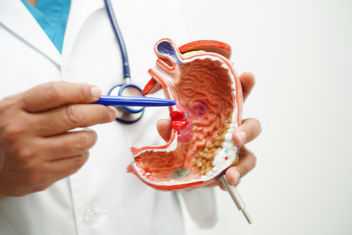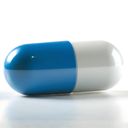Peptic Ulcer Disease: Treatment Overview
March 14, 2023Peptic ulcers affect more people than you might realize. Peptic ulcer disease can be very painful, but there are treatment options available. Read on to learn more about treatment options for peptic ulcer disease.

The Inside Rx Blog
Get the Inside Scoop on tips & tricks that may help your family save on prescriptions!
Subscribe to stay up to date with the latest news and tips
About four million Americans currently have active peptic ulcers, and around 350,000 people are diagnosed each year. While peptic ulcers can be painful and uncomfortable, treatment options are available. Treatment, such as medication, can cure peptic ulcers and help prevent them from occurring again. However, the treatment of choice may vary depending on the severity of the condition.
Continue reading to learn more about peptic ulcer disease and how it’s treated.
What Are Peptic Ulcers?
There are three different types of peptic ulcers:
- Gastric ulcers are ulcers that form inside the stomach
- Esophageal ulcers are ulcers that form in the lining of the esophagus
- Duodenal ulcers appear in the duodenum, which is the upper part of the small intestine
Peptic ulcers are usually caused by a Helicobacter pylori (H. pylori) infection or the use of nonsteroidal anti-inflammatory drugs (NSAIDs). Examples of NSAIDs include ibuprofen (Motrin®, Advil®) and naproxen (Aleve®, Naprosyn®). Stress and spicy foods do not cause peptic ulcers but may worsen symptoms.

Vyvanse Coupon Guide 2025: How to Cut Your Prescription Costs

Chronic Kidney Disease: Warning Signs You Shouldn't Ignore

Seasonal Allergies Treatment: Simple Solutions That Bring Real Relief

Lost Your Job? Here's How to Get Prescriptions Without Insurance Today
Symptoms
Many patients do not have any symptoms of peptic ulcers. For those that do, the symptoms include heartburn, nausea, vomiting, bloating, and burning stomach pain, often in the upper abdomen. Treating Peptic Ulcer Disease
Treatment for peptic ulcer disease aims to:
- Reduce the production of stomach acid
- Relieve symptoms
- Heal the ulcer
- Prevent it from reoccurring
- Prevent complications (such as bleeding which could cause anemia, or dark red to black stool)
Peptic ulcer treatment will vary based on the underlying cause. Treatment may involve eradicating an H. pylori infection, minimizing or stopping the use of NSAIDs, and promoting healing with acid-reducing medication.
Medication
Doctors and healthcare providers often prescribe a combination of medications to treat peptic ulcers. Discuss the best course of treatment with your healthcare provider.
Proton Pump Inhibitors
These medications, also known as PPIs, reduce stomach acid by blocking the action of certain enzymes that line the stomach. Reducing stomach acid can help decrease irritation of the ulcer and allow it to heal. Most peptic ulcer treatment regimens will include a PPI.
Examples of PPIs include omeprazole (Prilosec®), lansoprazole (Prevacid®), rabeprazole (Aciphex®), esomeprazole (Nexium®), dexlansoprazole (Dexilant®) and pantoprazole (Protonix®). PPIs may be prescribed by a healthcare provider and some are available over-the-counter (OTC).
Antibiotics
If an H. pylori infection is found to be the cause of the peptic ulcer, a healthcare provider will usually recommend a combination of two antibiotics to kill the bacteria. Amoxicillin, clarithromycin and metronidazole (Flagyl®) are examples of potential antibiotics that may be prescribed.
H2 Blockers
H2 blockers, also known as H2 receptor antagonists, work by blocking H2 receptors in the stomach which help reduce the amount of acid produced in the stomach. Like PPIs, H2 blockers can help ease pain and promote healing.
Commonly recommended H2 blockers include famotidine (Pepcid®), cimetidine (Tagamet®) and nizatidine. H2 blockers can be prescribed by a healthcare provider and some are available OTC.
Cytoprotective Agents
In some circumstances, a healthcare provider may recommend certain drugs known as cytoprotective agents. These drugs help protect the lining of the stomach and small intestines to prevent or treat an ulcer. Sucralfate (Carafate®) and misoprostol (Cytotec®) are examples of such drugs.
Surgery
Serious problems caused by ulcers may require surgery. You might need surgery if you experience a severe complication, such as a perforation or acute bleeding. However, surgery is only reserved for severe cases due to the availability of effective medications.
Lifestyle Changes
Lifestyle changes may be recommended to help prevent or treat a peptic ulcer. A healthcare provider may recommend lifestyle changes in addition to medication. These consist of:
- Limiting alcohol consumption
- Quitting smoking
- Limiting the use of NSAIDs
- Washing your hands often and properly preparing food to prevent an H. pylori infection
Omeprazole
$ 10.38Lansoprazole
$ 7.88Bottom Line
Medication, surgery and lifestyle changes may be recommended as part of peptic ulcer disease treatment. The most appropriate treatment option will depend on the severity of symptoms and your overall condition. It’s important to consult a healthcare provider to determine the best treatment option.
Sources:
- https://www.niddk.nih.gov/health-information/digestive-diseases/peptic-ulcers-stomach-ulcers/treatment
- https://www.mayoclinic.org/diseases-conditions/peptic-ulcer/diagnosis-treatment/drc-20354229
- https://www.hopkinsmedicine.org/health/treatment-tests-and-therapies/peptic-ulcer-disease-treatment
- Peptic Ulcer Disease - American College of Gastroenterology (gi.org)